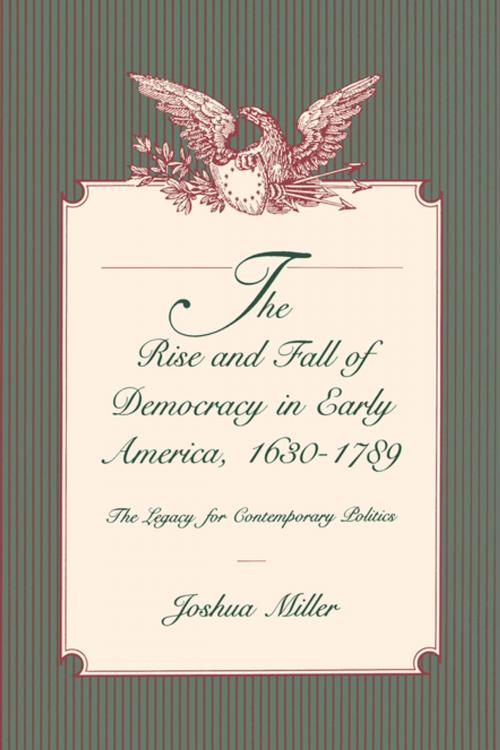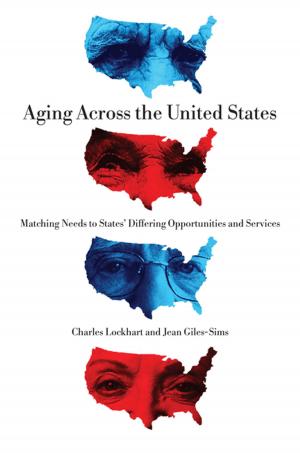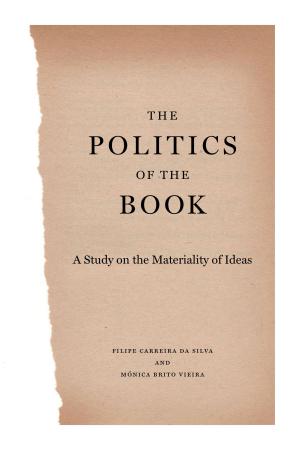The Rise and Fall of Democracy in Early America, 1630–1789
The Legacy for Contemporary Politics
Nonfiction, History, Revolutionary, Social & Cultural Studies, Political Science, Politics, History & Theory, Government| Author: | Joshua Miller | ISBN: | 9780271076270 |
| Publisher: | Penn State University Press | Publication: | April 29, 1991 |
| Imprint: | Penn State University Press | Language: | English |
| Author: | Joshua Miller |
| ISBN: | 9780271076270 |
| Publisher: | Penn State University Press |
| Publication: | April 29, 1991 |
| Imprint: | Penn State University Press |
| Language: | English |
The Rise and Fall of Democracy in Early America describes and explores the emergence of a directly democratic political culture in America, the Federalists' theoretical campaign against that culture, and the legacy of the struggle over democracy for politics today. The Rise and Fall of Democracy in Early America traces the rise of democracy in America beginning with the Puritans of New England; the radicalization during the eighteenth century of Puritan notions of community, autonomy, and participation; and the Antifederalist attempt to preserve a democratic political culture in the face of Federalist efforts to centralize power and distance it from the people by the passage of the 1787 Constitution.
Despite its historical concerns, this book is not a history of institutions or a history of ideas. It is a work of political theory that explores certain early American texts and debates, and discusses the theoretical questions raised by those texts and debates, emphasizing those issues most relevant to democratic thought in our own time. Among the many insights into our democratic heritage that Joshua Miller affords us in his discussion of the Puritan theory of membership and the Antifederalist theory of autonomous communities is the hitherto obscured affinity between democracy and conservatism.
Whereas many treatments of early American political thought make the debate over the ratification of the Constitution appear dry and abstract, this book shows the clash of political values and ideals that were at the heart of the struggle. It illustrates how the Federalists employed a democratic-sounding vocabulary to cloak their centralizing, elitist designs.
Miller introduces readers to a political theory of direct democracy that is presented as an alternative to Marxism, liberalism, and mainstream conservatism. This new democratic theory based on an early American political tradition should serve as a stimulus for rethinking the directions we are taking in politics today.
The Rise and Fall of Democracy in Early America describes and explores the emergence of a directly democratic political culture in America, the Federalists' theoretical campaign against that culture, and the legacy of the struggle over democracy for politics today. The Rise and Fall of Democracy in Early America traces the rise of democracy in America beginning with the Puritans of New England; the radicalization during the eighteenth century of Puritan notions of community, autonomy, and participation; and the Antifederalist attempt to preserve a democratic political culture in the face of Federalist efforts to centralize power and distance it from the people by the passage of the 1787 Constitution.
Despite its historical concerns, this book is not a history of institutions or a history of ideas. It is a work of political theory that explores certain early American texts and debates, and discusses the theoretical questions raised by those texts and debates, emphasizing those issues most relevant to democratic thought in our own time. Among the many insights into our democratic heritage that Joshua Miller affords us in his discussion of the Puritan theory of membership and the Antifederalist theory of autonomous communities is the hitherto obscured affinity between democracy and conservatism.
Whereas many treatments of early American political thought make the debate over the ratification of the Constitution appear dry and abstract, this book shows the clash of political values and ideals that were at the heart of the struggle. It illustrates how the Federalists employed a democratic-sounding vocabulary to cloak their centralizing, elitist designs.
Miller introduces readers to a political theory of direct democracy that is presented as an alternative to Marxism, liberalism, and mainstream conservatism. This new democratic theory based on an early American political tradition should serve as a stimulus for rethinking the directions we are taking in politics today.















